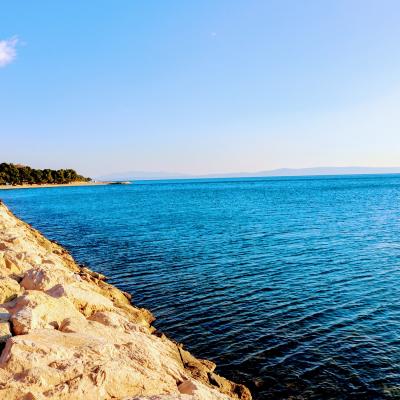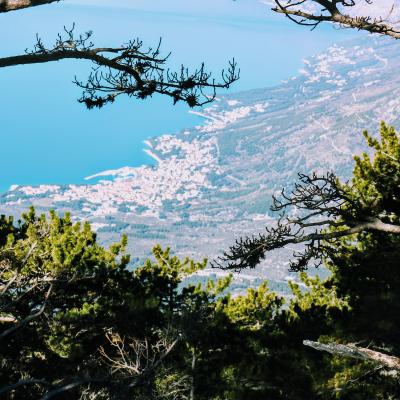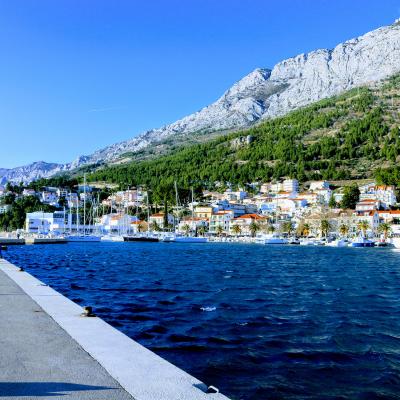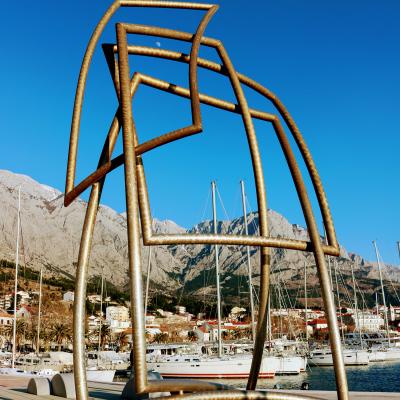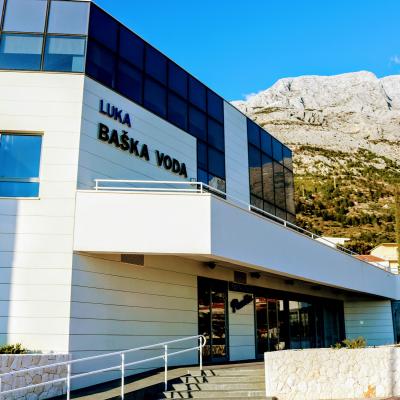Baška Voda, once a settlement of traders, fishermen and farmers, has today developed into a tourist destination with all features of a Mediterranean town. The crystal clear Adriatic Sea, long pebble beach, the smell of pine trees, the shade of palms, by the roots of the majestic mountain Biokovo with the efforts of the locals to replenish natural beauty with their welcome, rich offer, cultural, gastronomic and sporting facilities makes Baška Voda a perfect place to stay as well to live in.
Archaeological finds testify that in the early Bronze Age, the advantages of life on the area of today's Baška Voda, in the area of Gradina, were recognized by the population, while in the late antiquity the population raised a fortress in Gradina to escape from the breach of barbarian. On the existence of the Aronia settlement in the antiquity, apart from the archaeological finds, the scientists have affirmed their claim with Tabula Peutingerian, a map on which the town of the same name is indicated on the site of today's Baška Voda. The remains of the drywall are still visible today. Numerous ceramic pottery, amphora, coat-of-arms, as well as a multitude of grave inscriptions and attachments of the indigenous Illyrian population and the new-newcomer Roman were found as well. Archaeological finds in the wider area of the site indicate the existence of more villae rusticae. In the 7th century, the Slavs occupy Aronia and it ceases to exist.
Over the next thousand years there are no traces of urban life by the sea, but shepherds from the Bast lead treasure close to the sea and feed it at bascas water spring, a source of drinking water, and it should be assumed that the first buildings were raised as shelters for shepherds.
After the Turks' persecution and the disappearance of the pirates, the population began to return from the Bast to the coast and re-populate the new history of Baška Voda is written. The oldest written record of Baška Voda is from the 17th century. On the map of Dalmatia, made in 1686 by the Italian geographer and cartographer Vincenzo Maria Coronelli, the name of Basca was entered. The second Italian cartographer, Marcelo, in 1690, marked the same place on his map by the name of Fontana di Basca. The name Baska Voda is mentioned for the first time in 1724, on the document of sale of the house. In 1750, the late Baroque church of St. Lovre, and the place at that time has less than ten houses. Only a hundred years later, a stronger settlement of Baška Voda begins. In 1889 church of St. Nicholas, dedicated to the patron saint of Baška Voda was build. In 1845 Baška Voda received the first school and in 1900 the post office. With the construction of a pier in 1912 Baska Voda became the most important port in this area through which intensive trade between the islands and „Zabiokovlje“(all citys, villages behind mountain Biokovo) took place. The first inhabitants were engaged in agriculture fishing and maritime. The beginning of tourism, which is today the main economic activity of the place, is the construction of the first hotel in Baška Voda, "Slavija" in 1930. As if to announce the glittering future of Baška Voda tourism, this hotel was rewarded with a gold medal in London on 1936 at the World Expo in London. Today, in its building is the headquarters of the Baska Voda Municipality.
Baska Voda today is meaningly tourist destination, many will say the most beautiful on the Makarska Riviera, and some ,one of the most beautiful places on the Adriatic. It`s endowed with the nature of exceptional beauty. Nearly one point connects the blue sea and the rich forest belt, all of which is coated with the magnificent white stone of Biokovo. The climate here is also exceptionally. The meteorologists have calculated that Baška Voda has an average of 2,700 sunny hours a year. All of this is improved by hard-working people who appreciate and improve what nature has give to them. Thanks to all this, Baska Voda has been for the last few years in a row awarded with the Blue Flower , golden sign, the biggest tourist award in Croatia. In addition to the beautiful nature, sea and sun, visitors can also enjoy the rich offer, taste Dalmatian specialties, enjoy the authentic architecture, original „klapa“ singing, and beautiful views of the sea and nearby islands, which often stops the breath. Baška Voda is also suitable for a number of one-day trips to the surroundings. After a full and active day in the sun, sea and excursions you can enjoy the many cafés and terraces with live music, concerts and fishermen's evenings during the „Baška Voda Summer“ or the starry sky with the sound of the waves.

